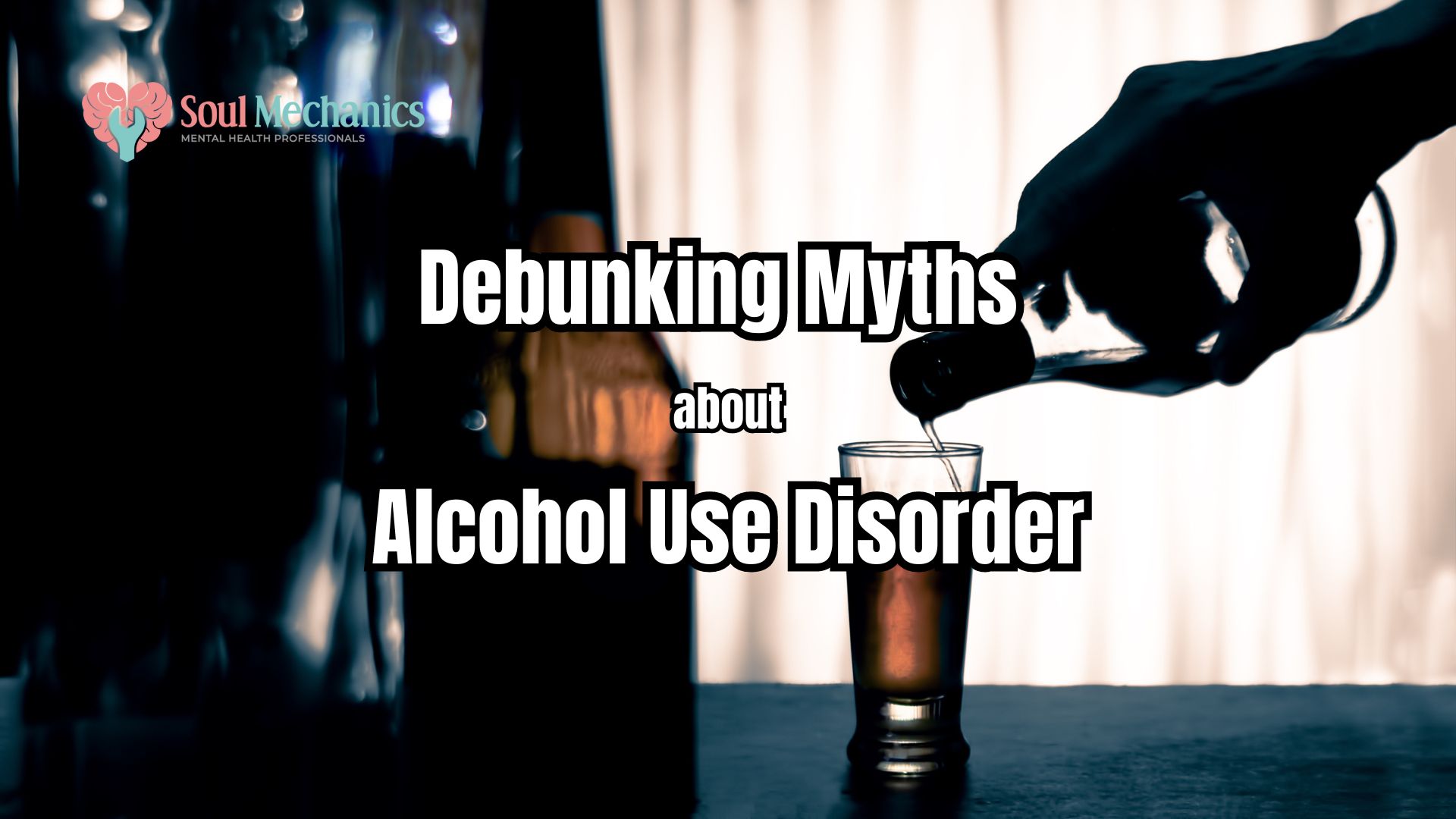Debunking Myths about Alcohol Use Disorder
Debunking Myths about Alcohol Use Disorder

Written By: Kelly Chan Jia Li, Clinical Psychologist (MAHPC(CP)00353)
Alcoholism, also known as alcohol use disorder (AUD), is a chronic condition characterized by an inability to control one’s drinking and continued use of alcohol despite adverse consequences, increased tolerance and physical dependence. Alcoholism can have severe health and social impacts, including liver damage, relationship problems, and impaired judgment. However, the understanding of alcoholism is constantly surrounded by myths and misconceptions. These false beliefs can create stigma, which prevents individuals from seeking help and makes it harder for society to understand the fundamental nature of the condition. Hence, this article will debunk some of the common myths about alcoholism.
Myth 1: Individuals with Alcohol Use Disorder Have Lack Self-Control
Many individuals believe that those struggling with alcoholism lack the willpower or self-control to stop drinking. In reality, alcoholism affects people from all walks of life, regardless of their character or strength of will. It is essential to note that the development of alcoholism is influenced by a combination of factors.

These factors include genetic predisposition, exposure to alcohol at an early age, the accessibility of alcohol, mental health conditions or any other social and psychological influences. Let’s imagine someone with a medical condition. We do not blame them for their condition or expect them to manage it through willpower alone. Similarly, individuals with alcohol use disorder need medical and psychological support to manage their condition.
Myth 2: Individuals with Alcohol Use Disorder Consume Alcohol Daily
When thinking of alcoholism, they often imagine someone who drinks heavily every single day. While some individuals with alcohol use disorder do consume alcohol daily, many others have different patterns of drinking that are less obvious but equally harmful. Some may binge drink occasionally, while others may drink steadily over time. For example, someone may drink heavily on weekends, often consuming large amounts in one sitting. Despite not drinking during the week, they still struggle with alcoholism due to their binge drinking behaviours.
Myth 3: You Can’t Have Alcohol Use Disorder if You Have a Job
Many believe that individuals with alcohol use disorder are homeless or unemployed. In reality, they can hold jobs, maintain families, and appear successful. The disorder often remains hidden behind a facade of normalcy. Studies found that alcoholism is prevalent across all socioeconomic groups, with no significant difference in rates of alcohol addiction between different income levels.

This demonstrates that alcoholism does not discriminate based on socioeconomic status or occupation. individuals with alcohol use disorder come from all walks of life and can lead seemingly functional lives.
Myth 4: Individuals with Alcohol Use Disorder Don’t Want to Quit
Some think that alcoholism is a lifestyle choice, but it is a medical condition that affects the brain’s reward system and decision-making processes, leading to changes in behaviour, cognition, and emotional regulation.

Over time, alcohol changes the brain’s chemistry, making it hard to quit without help. Despite wanting and having the desire to quit drinking, the brain’s dependency on alcohol could make it extremely difficult for individuals with alcohol use disorder to quit without professional treatment.
Myth 5: You Have to Hit Rock Bottom Before Seeking Help
Many believe that individuals with alcohol use disorder must reach their lowest point before seeking help. This myth can be dangerous, as it may discourage people from seeking assistance until their situation becomes dire. In reality, seeking help at any stage of alcoholism is crucial for a successful recovery. Early intervention and treatment can prevent the escalation of alcohol-related problems and improve the chances of recovery.
Reminder: If you or your loved ones are struggling with addiction problems, please don't hesitate to reach out to us at Soul Mechanics KD or Soul Mechanics Ipoh. Remember, seeking help is not a sign of weakness but strength!
Treatments for Alcoholism
Comprehensive treatment for alcoholism often includes a combination of therapies, such as cognitive-behavioural therapy (CBT) and motivational interviewing, to address underlying psychological and behavioural factors contributing to addiction. Support groups, such as Alcoholics Anonymous (AA), can provide individuals with a network of individuals who understand their struggles and can offer guidance and support.

In some cases, medication may also be prescribed to help manage withdrawal symptoms and cravings. Furthermore, lifestyle changes, such as avoiding triggers and developing healthy coping mechanisms, may be necessary to maintain sobriety.
In Summary
Understanding the truth about alcoholism is crucial in providing the proper support and reducing stigma. It is essential to recognize that alcoholism is a chronic disease that requires ongoing support and treatment rather than a personal choice or moral failing. By dispelling these myths, we can contribute to breaking down the stigma surrounding alcoholism and encourage those in need to seek help without judgment. With that, society can foster a more compassionate and informed approach to helping those struggling with alcohol use disorder.
If you enjoyed reading this, why not broaden the horizon of knowledge by learning about "Is Alcoholism a Way to Cope with Depression?"? You can read the blog here.
For more content related to mental health do follow us on our official Instagram.

